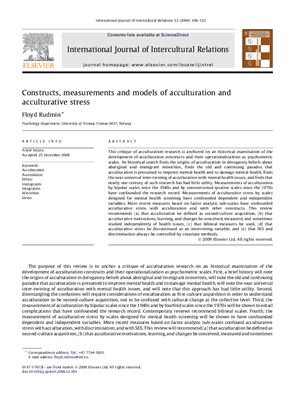Структуры, измерения и модели аккультурации и стресс
аккультурации.
Статья, описывающая эксперимент, посвященный исследованию аккультурации из научного журнала Inteational Joual of Intercultural Relations (на англ. яз)
This critique of acculturation research is anchored on an historical examination of the development of acculturation constructs and their operationalizations as psychometric scales. An historical search finds the origins of acculturation in derogatory beliefs about aboriginal and immigrant minorities, finds the old and continuing paradox that acculturation is presumed to improve mental health and to damage mental health, finds the near universal inter-twining of acculturation with mental health issues, and finds that nearly one century of such research has had little utility. Measurements of acculturation by bipolar scales since the 1940s and by unconstrained ipsative scales since the 1970s have confounded the research record. Measurements of acculturative stress by scales designed for mental health screening have confounded dependent and independent variables. More recent measures based on factor analytic sub-scales have confounded acculturative stress with acculturation and with other constructs. This review recommends (a) that acculturation be defined as second-culture acquisition, (b) that acculturative motivations, leaing, and changes be conceived, measured, and sometimes studied independently of health issues, (c) that bilineal measures be used, (d) that acculturative stress be discontinued as an intervening variable, and (e) that SES and discrimination always be controlled by covariate methods.
Статья, описывающая эксперимент, посвященный исследованию аккультурации из научного журнала Inteational Joual of Intercultural Relations (на англ. яз)
This critique of acculturation research is anchored on an historical examination of the development of acculturation constructs and their operationalizations as psychometric scales. An historical search finds the origins of acculturation in derogatory beliefs about aboriginal and immigrant minorities, finds the old and continuing paradox that acculturation is presumed to improve mental health and to damage mental health, finds the near universal inter-twining of acculturation with mental health issues, and finds that nearly one century of such research has had little utility. Measurements of acculturation by bipolar scales since the 1940s and by unconstrained ipsative scales since the 1970s have confounded the research record. Measurements of acculturative stress by scales designed for mental health screening have confounded dependent and independent variables. More recent measures based on factor analytic sub-scales have confounded acculturative stress with acculturation and with other constructs. This review recommends (a) that acculturation be defined as second-culture acquisition, (b) that acculturative motivations, leaing, and changes be conceived, measured, and sometimes studied independently of health issues, (c) that bilineal measures be used, (d) that acculturative stress be discontinued as an intervening variable, and (e) that SES and discrimination always be controlled by covariate methods.

